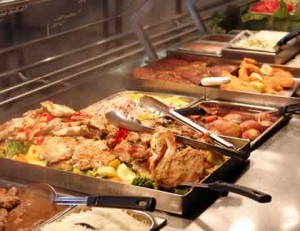 Everyone knows the phrase “cafeteria Catholics.” It is used pejoratively to categorize one way that Catholicism is lived: as a series of opinions that are picked willy-nilly based on the superficial feelings and unguided judgment of an individual.
Everyone knows the phrase “cafeteria Catholics.” It is used pejoratively to categorize one way that Catholicism is lived: as a series of opinions that are picked willy-nilly based on the superficial feelings and unguided judgment of an individual.
But does the cafeteria ever close? Are all American Catholics, in some way, “cafeteria Catholics”? This thought came to mind with the recent controversy over the denial of communion in Washington, DC. The priest who denied communion to a lesbian woman has issued a statement recounting the details of the incident as well as his rationale for acting the way he did.
One way to understand this incident, and “cafeteria Catholicism” in general, is through the idea of bureaucracy. This word brings up sentiments from deep in the gut for Americans. We may think about inefficiency, impersonality, and irrationality. For a founding luminary of sociology, though, bureaucracy was an ideal system for ensuring just the opposite. It was a hierarchical system that kept members in line, generated predictable decisions based on clear processes, and treated people equally. Think of how the Model T was made, or how the military functions.
Or, think of the Catholic Church.
The Catholic Church (along with most Western religious traditions) is a type of bureaucracy. It continues a tradition dating back 2000 years. It has a set of standardized routines for how to do certain things (the sacraments!) And, it has its own legal system of precise rules and regulations: canon law.
Cafeteria Catholics and the controversy in Washington, D.C. highlight some problems that every bureaucracy faces.
How can individual Catholics, in an era in which the authority of the Church has waned and multiple authentic interpretations of Catholicism exist, be inspired to follow the traditional routines of an ancient faith? This is the struggle individual Catholics of all stripes face. I highly recommend the book Sense of the Faithful to understand this. As Jerome Baggett demonstrates by talking to lots of Catholics and visiting very different parishes, every Catholic (at least in the United States) must struggle with choices regarding their faith and make decisions.
And how can individual priests, in an era where moral and political issues have become polarized, sort their way through correct responses to the one in D.C.? You might check out this blog from a canon lawyer who demonstrates that canon law covers just such cases, if only the rules are followed.